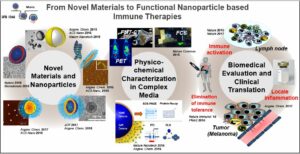We have moved our homepage. You will find our new site here >

from July 1st 2017 till June 30th 2021. This confirms the leading position of Mainz as a center for the development of nanomaterials for tumor-immuno therapy.(Press release JGU, 21.06.2017, GERMAN) ...>
The coordinated research center CRC 1066 aims at the development of functional nano-particular carriers as basis for a tumor-immuno therapy of the malignant melanoma (as a model tumor). For this purpose chemists, biologists and medical scientists work together in three highly interrelated research lines: (1) By synthesizing a broad variety of nano-particular carrier systems, which can be adjusted to the special needs of the immunotherapy, we lay the foundation for a localized modulation of the immune-system. (2) By characterizing the interaction of these particles with biological media and cells, we learn how to control cell-uptake and biodistribution and how to vary them to address the immune-system most effectively. (3) By performing functional in vitro and in vivo experiments, we study the effect of these carriers on subsets of the immune-cell population and on the immune system as a whole, aiming at a response directed against the melanoma, as our model system. To fight the melanoma we rely thereby on a combination of (i) an activation of the immune-system, (ii) an elimination (or reduction) of tolerance mechanisms and (iii) the induction of a localized inflammation.
We use nano-particular carriers for this purpose because of two reasons: At first nano-particular carriers can transport more than one active compound (e.g. antigen and adjuvant) and they can protect sensitive drugs like DNA or RNA. This makes them very effective for a modulation of the immune system. Next, nano-particular carriers offer a possibility to modify the biodistribution of these active compounds, which is a prerequisite to obtain a localized response. The synthesis of suitable nano-carriers is thereby rather complex and requires refined chemical modifications to acquire the properties needed to modulate the immune-system. To this end this CRC aims finally on the development of nano-particular systems to modulate the immune response in vivo in a way, which allows the development of a therapy against the melanoma, as a model.
The interdisciplinary character of this CRC is also reflected by the board of spokespersons with Prof. Dr. Rudolf Zentel (Organic/Polymer chemistry, JGU) as our speaker, and the supporting deputy speakers Prof. Dr. Stephan Grabbe (Department of Dermatology, University Medical Center) and Prof. Dr. Katharina Landfester (Max-Planck-Institute for Polymer Research).
Further board members are Prof. Dr. Dr. Detlef Schuppan as an complementary representative from the University Medical Center and PD Dr. Matthias Barz as junior scientist's representative.